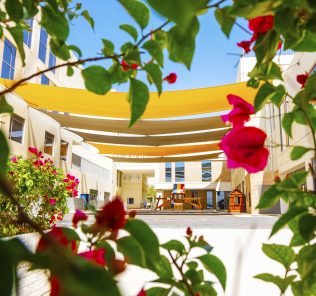Letter from the Editor: Holidays, Covid, Eid, Childcare, Schools and the Private Sector. Is it just me or are Dubai kids hardly ever at school?
The announcement that UAE school and nursery children will be having a full week off lessons for the Eid-Al-Fitr 2022 public holiday has been met with a mixed reaction from UAE parents.
Many were thrilled by the news that schools will be closed from Monday 2nd May until Monday 9th May – and excited at the chance to enjoy nine whole days (including the weekends) celebrating the religious holiday and spending time with family.
Others, however, were less enthusiastic. With the announcement coming only 12 (very short) school days after children have just been off for at least two weeks for Spring Break, some parents have been asking, ‘are UAE kids ever actually at school anymore?!’
Too many days off?
All schools in Dubai, and all schools and nurseries in Abu Dhabi, will now enjoy the Eid holiday from April 30th until 6th May, with lessons to recommence on May 9th, according to circulars by Dubai school regulator the KHDA and Abu Dhabi school regulator ADEK.
Early childhood education centres in Dubai have been told they may adapt their operating hours during Eid in line with official holidays and the needs of their parent communities.
This decision by the private school regulators was made following an updated communication by the UAE Cabinet; an earlier announcement said that government employees would observe the Eid Al Fitr holiday from the 29th day of Ramadan until Shawwal 3 – which corresponds to April 30th until either 3rd or 4th May. The update last week then revised this – instead allowing for a full week’s holiday for all federal government entities to celebrate Eid.
The result? The extended time off for schools has come as something of a surprise for many UAE parents – especially those working in the private sector, many of whom face childcare issues. Why? Most private companies are expected to follow the original holiday announcement of 29th Ramadan until 3 Shawwal.
The Dubai private school regulator, the Knowledge and Human Development Authority (KHDA) declared the holiday to parents in its usual humorous fashion across its social media channels. The tile read:
“Bad news for those of you who were hoping for a short Eid holiday – it’s a whole week!”
View this post on Instagram
However, in between the amusement, cheers and emoji applause from happy parents and teachers, one social media user commented:
“I am very disappointed. You are giving too many days off. They just came back from two weeks off. And they had shorter hours in Ramadan. So why cut two more days off next week?”
The news touched a very sore nerve for some parents. At the time of writing this, there were 50 comments underneath the post, several of which contained some further notes of discord.
One user wrote:
“Why? We literally have GCSEs”.
Another user also pointed out the reduced opportunity for school work on the run up to exams:
“I wonder when our children will study?
Spring break, Eid break, half break, this break, that break… a bit too much.”
When will the studying actually happen?
One thing that is beyond argument is that this has been yet another year of many changes and school disruptions.
We kicked off 2022 in the UAE with a sudden adjustment to a new 4.5-day working week and a revised Saturday-Sunday weekend. In a groundbreaking move, the UAE became the first country to shorten its employees’ official working week by half a day. And schools followed suit – giving families an extra half-day on Fridays, plus Saturday and Sunday, to spend together. Schools had to scramble to adapt their curriculum-delivery to the new timings. In general, however, this was hailed both as an innovative, and insightful, decision that highlighted the UAE’s progressive, family-friendly and wellbeing-positive approach.
But…
We also began January 2022 in the depths of a third-wave COVID-19 spike. At the last-minute many Dubai schools – and all those in Abu Dhabi, were put on distance learning for two or more weeks, and many students went on to experience intermittent home learning and pockets of self-isolation as individual classes or bubbles became categorised as COVID close contacts.
Revised COVID protocols in March finally gave some reprieve, and made for a much more pre-pandemic-style few weeks, with class bubbles popping and school trips, events and assemblies all back on the agenda.
But then along came Spring Break, followed by a return to school on reduced Ramadan hours, with a maximum of five hours per day of lessons Monday to Thursday, and an obligatory finish time of 12 noon on a Friday.
With this week’s announcement that Eid Al Fitr will be a whole week of holiday for UAE schools, it’s little wonder that some parents have been wondering: is there actually enough school time this year for all the learning in the curriculum to get done? Some have even raised the topic of receiving a school fees discount, since the number of teaching hours their children will receive is less than originally stated.
So we asked schools what is actually going on…
Schools plan their curricula delivery with possible changes and the potential Islamic holidays in mind, says Nathan Sadler, Primary Principal, GEMS Wellington Academy – Silicon Oasis:
“I have worked in the UAE for 11 years, and Ramadan has fallen within Term 3 for seven of these. The reduction in teaching hours is not new and is something that schools can prepare for in advance when planning curriculum coverage.”
“Additionally, while Eid holidays or other national holidays are often only confirmed a few days in advance, we are used to responding at short notice and we act quickly to ensure our school calendar and events are changed to suit these dates.”
“The school days are mapped out well in advance of the start of every academic year. For example, we have just completed our 2022-23 calendar and shared this with our school community. The reduced timings for Ramadan and change to a 4.5-day working week have not affected the days in school.”
“Where Eid dates are unknown, we publish these as ‘expected holidays’, and gain approval from the KHDA to share these with our school community.”
While the last-minute changes to school day timings have naturally kept schools on their toes, it’s also made them agile and creative when it comes to what the school day looks like. David Flint, Principal of South View School, says:
“This has indeed been a challenge, both in terms of short notice timetable re-writing, and ensuring continued quality learning in both pastoral and academic contexts. We have reviewed and upgraded our timetable – and been able to maintain and, in some cases, increase learning time in comparison to Term 1 with only a modest extension to the school day.”
“As a new school, we have been lucky that our examination classes are currently coming on stream. As such, our systems can be configured ahead of time to best meet the needs of our examination year groups with the pandemic and its restrictions very much in the rear-view mirror.”
“Parents have actually been very supportive with some asking specific questions in terms of reduced learning time. As part of our review, we have been able to share the data with them and consult with them in terms of our strategy for tackling the sudden change in the operating environment.”
So should we now be increasing the time children are at school for them to catch up?
The answer is a resounding ‘NO!’, according to the schools we have spoken with.
The number of hours spent at school do not necessarily correlate to the quality of learning taking place, say school Principals. Breaks, rest and religious holidays are important. They are times to reflect and learn other qualities and values that can’t always be taught in a classroom.
Nathan Sadler, Primary Principal, GEMS Wellington Academy – Silicon Oasis says:
“I do not believe that children should be at school for a great number of hours in one day, as their day is already long in comparison to other countries. As part of their holistic development, it is important for them to have downtime, socialise and pursue other interests outside school hours.”
David Flint, Principal, South View School, agrees:
“The question of extending term time in the pursuit of educational quality is not a new discussion. The argument for increasing term time is a resurgent one and is often not only focussed on the interests of improving learning but also to enable middle- and low-income families to not have to spend further on childcare during school holidays. Whilst the pandemic has undoubtedly had a profound impact on children’s development and growth, the danger of using a “catch up “ based argument for recovering perceived lost learning in order to increase school session times is, I believe, fundamentally flawed.”
While it is vital to ensure there is enough time for children to be well educated, the case for purely longer school days or terms is overly simplistic, says Flint:
“Children are on an educational and personal developmental journey where frequent rest and time out of school are fundamental to their learning, wellbeing and overall growth. Such experiences create effective, balanced human beings who will positively learn about and contribute to our society both now and in the future.”
“They are learning to be curious and to be human so that they can work effectively and creatively in a diverse and largely unknown future global environment; this takes time and includes both formal (school) and informal (out of school) settings.”
“Children are not employees in a factory where longer hours offer greater output and profit.”
With every fact in the world now accessible in the palm of our hands at the touch of a button, school is no longer just about gaining knowledge, says Mr Flint:
“The nature of the global economy has changed from one with a recall based procedural dominance to one of analysis, enquiry and exploration. As such, the current situation is more sophisticated. It needs careful, evidence-based attention before changing the established environment.”
“If the pandemic has taught us anything, it is the importance of mental health, wellbeing and balance as essential aspects of the individual and of society. These themes are, in my opinion, the priorities for modelling a reviewed school year – rather than the overly simplistic approach of more time equals better outcomes.”
What is the reality – are our children really having fewer hours at school?
Even today, the truth is actually not what it appears. You can read here exactly how many days of school UAE children have compared to those in other parts of the world. We are a long way from being France, for example – here children actually spend more than 20 days less in school than the average already. That is more than a whole month less.
So when I find myself asking, as many other parents, whether UAE kids are ever actually in school anymore, I have to get perspective – and ask why am I feeling like this.
The Answers…
And the answer I think is twofold.
Like so many parents, I am frankly frazzled trying to juggle the constantly shifting timings and the childcare arrangements I must make as a result of the changes that this year, in particular, has brought – and the reason is not holidays that are dependent on moon sightings, nor the change to a shorter working week, but rather the horrors of Covid, and private sector employers not playing their part and being left behind in a new family friendly world that is, or should be, evolving around us.
The 4.5-day working week and the revised Saturday-Sunday weekend is not a negative. It is a positive. A big one. It is groundbreaking. It will help our children, and all of us as parents, have a more balanced life. It is something to be celebrated. It highlights the UAE’s progressive, family-friendly and wellbeing-positive approach.
But we need the private sector to now play ball. They need now, too, to honour the values and lead of the government that has delivered a 4.5 day week. Otherwise, for working parents, all this has achieved is our children spending more time with childcare. And that was never the point.
And it is not just here that the private sector needs to catch up.
It is also true in the mismatch of holidays. For the working parent – who may or may not be able to stick to the Ramadan-timings guideline with their own work commitments – this also means an extra few hours every day when the children are out of school and, inevitably, wanting for something to do. And they are left turning, in most cases, not to family – but childcare.
And again, with the announcement that Eid Al Fitr will be a whole week of holiday for Dubai schools…
Yes, it is lovely news for students and teachers, and parents who work in the public sector, and definitely something to celebrate. But for many parents who work in the private sector – many of whom do not have the luxury of being able to take annual leave on short notice – the fact that private companies might only get two or three days off, while children are off for the full five days, throws up yet another childcare headache. And that hurts children.
The issue then, just perhaps, is not children spending too little time in school at all.
The real headache is, rather, a private sector behaving differently to schools and the changes taking place around us being driven by a family friendly, forward thinking government. The private sector has so far been given the freedom to choose whether to follow the government’s progressive lead and look out for the needs of its working parents – but, in the vast majority of instances, it is choosing not to do so.
We need alignment between holidays, schools and the private sector. As parents, we need to be able to use this time to spend positively with our children as an adjunct to their education. What we do not need is more juggling with childcare – and the guilt of not being able to make the most of the wonderful opportunities being set up for us by the government.
Children do need time outside of school for free play, family bonding and self-directed learning at home; it’s crucial. Fewer or shorter school days can mean better learning, not less learning. The insights children get while exploring in the garden, making up games with their siblings or simply getting bored in their bedroom can be some of the most important for their development. One thing we all realized during the pandemic is that we have a tendency to overschedule our kids, so the opportunity to take a step back, breathe and just do very little is precious.
And this better balance of learning in and outside school helps business and productivity. Business needs a future generation of creators, innovators, free thinkers – not drones who can recite facts without actually thinking. And it needs parents (and teachers) who are not frazzled.
And, yes, our schools are doing the best they can. We need to get to the stage where relaxed teaching staff are feeling chilled out about their reduced hours and using their time off for themselves, rather than the reality we sometimes see now: stressed teachers desperately trying to cram a regular year’s curriculum into the very irregular sort of year we have all experienced. We all need to accept that it will take time for the 4.5 day working week, and a (hopefully) more manageable Covid world, to find its equilibrium – and not throw the baby out with the bathwater.
It’s not, then, the amount of time that Dubai schoolchildren have off that makes things tricky for parents, but the fact that we’re not all operating from a level playing field. Schools are following in the government’s progressive footsteps, but much of the the private sector is lagging (far) behind. Covid has just exacerbated the difficulties here, not made them.
There’s no doubt that the UAE is one of the best and most family-friendly places to raise children in the world. It has handled the pandemic brilliantly, is jam-packed with fun family activities and events, and boasts stellar education options that are good value when compared with international counterparts. It also makes a point of valuing family time and employee wellbeing, and has made bold and innovative changes to its working week. These are things to treasure and to applaud.
Now we need the private-sector to get on board with the programme.
Until the private sector makes that decision, it is families and children that will suffer – and, this time next year, we will still all be diverted by the spurious question of whether our children are ever in school.
And all of this, in turn, rests on the simple challenge: if not now, then when?
© SchoolsCompared.com. 2022. All rights reserved.



























































Leave a Response